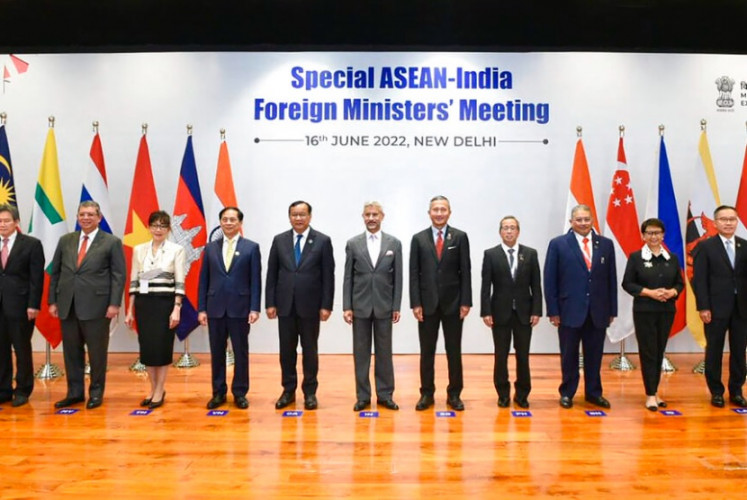Graft and gratuity should not be our culture
Change Size
 The Corruption Eradication Commission (KPK) on Sep 17 arrests Regional Representatives Council (DPD) chief Irman Gusman (center) a suspect in a bribery case related to sugar imports. (Antara Photo/Yudhi Mahatma)
The Corruption Eradication Commission (KPK) on Sep 17 arrests Regional Representatives Council (DPD) chief Irman Gusman (center) a suspect in a bribery case related to sugar imports. (Antara Photo/Yudhi Mahatma)
T
he recent arrest of Regional Representatives Council (DPD) speaker Irman Gusman on a bribery charge is surprising. Not simply is it to do with the amount of money accepted, Rp 100 million (US$7,600), which is considered “small” for many, but it is also linked to his perception as a politician with a clean track record, actively involved in the anti-corruption struggle.
News of corruption always oozes out from high ranking officials and lawmakers across the country. In the teeth of their high salaries, high government and legislative wages are not always instrumental in warding off potential corruption.
Petty corruption becomes unstoppable since it is, to a serious extent, still culturally accepted.
Culturally speaking, Indonesians like to give as a token of gratitude. It has become a kind of veiled knowledge and implicit necessity in social relations. Giving is then regarded as an expression of gratitude without being requested or asked for.
The expression is not enough to perpetuate cordiality and ease of interaction at a later date without giving more.
In social relationships, the spirit of giving is very positive because it boosts the culture of mutual assistance among citizens. According to Erich Fromm, a noted psychoanalyst, a healthy society is characterized by its citizens’ pride of what they give instead of what they have, suggesting that giving is better than having.
Yet the cultural spirit of giving is often misused so creating a great risk in public sector management, such as graft and gratuities.
Dealing with government structures and processes, present policy and administrative decisions, public sector management greatly relies on professionalism and transparency.
Professionalism means all works and services receive financial rewards based on quality, performance and productivity. One receives financial incentives based on what has been done and served.
Receiving money, goods, or services negotiated ahead of time or prior to the execution of work and decision making would be illegal.
Professional acts are hobbled due to corruption as all processes to be done — work and services — dispense with expected quality and standards.
In public sector management, the habit of giving has become destructive for the bureaucratic system since it is very likely to influence the actions of an official or person in charge of the public duty.
This destructive system is clearly viewed in unjust payment of wages, loss of quality control and lack of competition.
Transparency, which is an inherent part of public sector management, is not compatible with the habit of giving frequently, setting the scene for corruption.
While the principle of transparency exposes fairness, the habit of giving drives closure.
Unprecedented numbers of procurement-related scandals across the country, for example, have taken place without the knowledge of the authorized boards and have failed to comply with public procurement rules.
Reluctance to make procurement rules public, in effect, is aimed at consenting for particular groups to participate in the tendering process based on the principle of mutual benefit rather than that of equality.
Transparency
The habit of giving is unlike transparency from its tacit disposition. Graft and gratification are always found in secluded and unceremonious places, such as residences, golf courses, night clubs, cruise ships and others.
The fruit of mutual giving among ordinary people is crystal clear due to its wholeheartedness.
In contrast, it is ironic between government officials and businesspeople as it expects something in return.
In developed countries, like the US, Great Britain and many European nations, the power of giving is inspired by a philanthropic ethic — the effort or inclination to increase the wellbeing of humankind, as by charitable aid or donations.
That is why their donations to governments, for instance, turn into research or health centers. Many Western billionaires — Bill Gates, Warren Buffett and Michael Bloomberg to mention just a few — have declared they would give all their wealth to humanitarian causes. Their children will not enjoy a penny of their wealth when they die.
Unlike their Western counterparts, Indonesian billionaires and super-rich Indonesians give their fortunes to society due to the legal demands of corporate social responsibility.
Though there are exceptions for several down-to-earth and humble billionaires in the country, their financial gifts to the government cannot be fully translated into pure donations for humanitarian and scientific purposes, but are often attempts to influence policies and control the rules.
Public sector management in the country must be approached in a measurable manner, with professionalism and transparency being mighty yardsticks to achieve good governance.
The habit of giving needs to be preserved in social relations, to foster attention to those around us.
However, it should not move any further at the bureaucratic level, which has been repeatedly exploited to undermine objective and fair public decision making.
___________________________
The writer is a lecturer in the School of Cultural Sciences at Andalas University, Padang.








